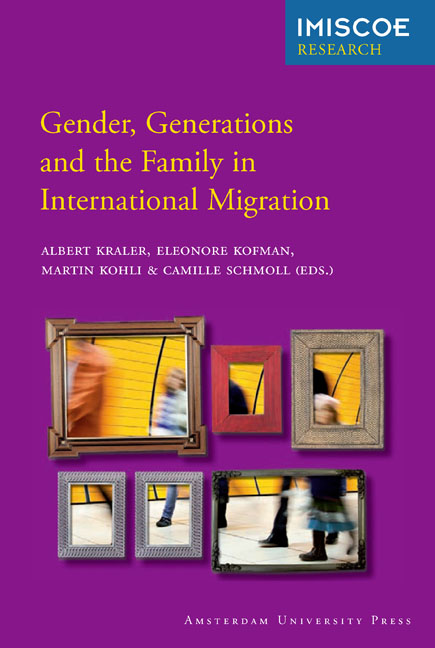Book contents
- Frontmatter
- Contents
- Preface
- 1 Introduction: Issues and Debates on Family-Related Migration and the Migrant Family: A European Perspective
- Section I The Family as a Moral and Social Order
- Section II Gender, Generation and Work in the Migrant Family
- Section III Marriage Migration and Gender Relations
- Section IV Transnational Family Lives and Practices
- List of Contributors
- Index
- Other IMISCOE titles
3 - Marriages, Arranged and Forced: The UK Debate
Published online by Cambridge University Press: 21 January 2021
- Frontmatter
- Contents
- Preface
- 1 Introduction: Issues and Debates on Family-Related Migration and the Migrant Family: A European Perspective
- Section I The Family as a Moral and Social Order
- Section II Gender, Generation and Work in the Migrant Family
- Section III Marriage Migration and Gender Relations
- Section IV Transnational Family Lives and Practices
- List of Contributors
- Index
- Other IMISCOE titles
Summary
Introduction
Arranged and forced marriages among immigrant and minority ethnic groups have been widely debated across Europe, and although the present chapter deals principally with developments in the United Kigdom between 1997 and 2009, it has wider theoretical implications. First, it builds on research reported elsewhere (Grillo 2008) in which the family is seen as a moral order, a social construct entailing beliefs, values and ideas by reference to which its members are identified, organised and bound together, though with widely diverse understandings cross-culturally of how familial relations should be defined and practiced. As such, under conditions of migration, it becomes a site of debate about who may, or should, do what, where and when (get married, have children, raise them in a certain way), and thus a powerful kaleidoscope through which to examine the tensions in multicultural societies. Secondly, the chapter contributes to an account of contemporary multiculturalism as a ‘negotiated order’, albeit one in which negotiations are in danger of breaking down.
In the UK, from 1960 to 2000, policy sought to control and regulate immigration while accepting that most immigrants were there to stay. There was increasing recognition of the legitimacy of cultural difference and willingness to allow the expression of such difference, within certain limits, in the private sphere and, to some degree, also in the public sphere. After the turn of the millennium, however, there was a backlash against this form of multiculturalism (Grillo 2009). Minority ethnic separatism (‘parallel lives’ in the ‘Cantle Report’ 2001), along with the persistence of ‘traditional’ practices, were deemed unacceptable for a society espousing liberal, democratic, individualistic, secular values. In this context, the family became a site of contestation around cultural and social differences, and policies intended to address them.
A site of contestation is a ‘terrain, a dynamic linguistic and, above all, semantic space in which social meanings are produced or challenged’ (Seidel 1985: 44). A closely interconnected set of institutions, discourses and practices became a battleground between social and cultural forces engaged in a struggle over rights and duties. In the case of the family, this battleground may be observed in many different social and institutional locations: speeches by politicians and religious leaders, policy statements, the media, academic writing, internet discussion groups and everyday conversations.
- Type
- Chapter
- Information
- Publisher: Amsterdam University PressPrint publication year: 2012



